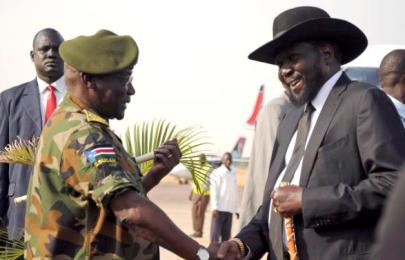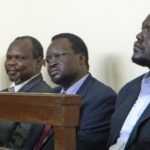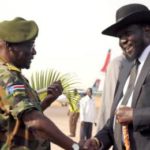South Sudan’s President Salva Kiir and his former army chief of staff apparently have reconciled, a week after a tense standoff in Juba threatened to escalate into violence.
The reconciliation happened Thursday at a prayer service at the president’s residence in Juba. Pictures surfaced on the internet showing Paul Malong hugging Kiir.
The coziness seems a world away from events last week in Juba, when tanks and dozens of government troops surrounded Malong’s house after he refused to release a platoon of soldiers guarding him.
Malong had been under house arrest at his residence since May, after a string of resignations by military officials who alleged there was ethnic bias in the army, and that soldiers were committing war crimes in the context of South Sudan’s civil war.
Earlier on Thursday, the UN secretary-general’s special representative in South Sudan, David Shearer, praised the Kiir administration for peacefully resolving the weeklong standoff with Malong.
The tanks and troops were withdrawn Saturday after Malong agreed to release 26 of his 30 bodyguards. Shearer said the move calmed tensions.
Shearer told reporters at a U.N. base in Juba that it’s important for South Sudanese to resolve their conflicts internally.
“This conclusion came down simply to the choice of putting South Sudan and stability in Juba before all other concerns. We are grateful for the statesmanlike way in which the situation was resolved,” said Shearer.
Shearer said he hoped the UN Security Council would renew the mandate for the U.N. peacekeeping in mission in South Sudan, which is due to expire a month from now.
A review team is scheduled to arrive in Juba from UN headquarters in New York within two weeks. Shearer said the team would assess the security situation and consult with officials from the government and aid agencies operating in South Sudan.
“This team will also spend two days in Addis Ababa, where it will meet with other South Sudanese groups, including the opposition,” said Shearer.
The review team will provide a report to UN Secretary-General Antonio Guterres, who will report the team’s findings to the Security Council. Shearer said the report would influence the Security Council’s decision on whether to renew the U.N. Mission in South Sudan (UNMISS) mandate.
If the team determines that security conditions have improved in South Sudan, Shearer said the U.N. would help coordinate the “voluntary safe return” of more than 200,000 internally displaced persons (IDPs) sheltering in six U.N. camps across the country.
That number has fluctuated depending on the security situation, but “the trend is now showing a slow decline,” said Shearer.
The UN special representative cautioned, however, that the UN was still far from announcing that conditions are safe for IDPs to return.
Shearer welcomed Kiir’s recent decree ordering security forces and local leaders to allow aid workers unfettered access to 6.2 million people in need of assistance across the country.
“We will continue to monitor the process of that access. The fact that it comes from the top means we anticipate and we expect others right down the chain of the security forces to follow that order,” said Shearer.








